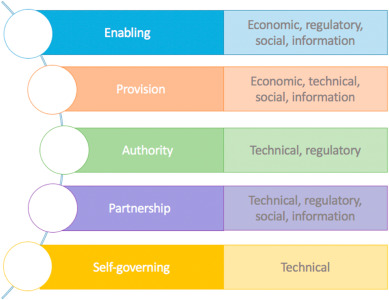The industrial symbiosis (IS) landscape is evolving at high speed. There is a growing interest in knowledge sharing and partnering, as is evident from the establishment of multiple industrial symbiosis (IS) networks at local and regional level. This article investigates the role of local governments in industrial symbiosis. It aims to build a theoretical framework explaining how local governments can reduce barriers to implementation of IS by applying different modes of governing.

Findings show that local governments can do many things to overcome barriers and thus enhance IS. In many instances, local governments can support IS in an enabling function, by coordinating relationships and material exchanges, providing infrastructure and funding. They can also apply authoritarian and self-governing principles to develop policies and regulations to support IS development, as well as planning and control mechanisms linked to their own material and resource flows.

In this figure : Barriers addressed by local governments through different governing modes.

